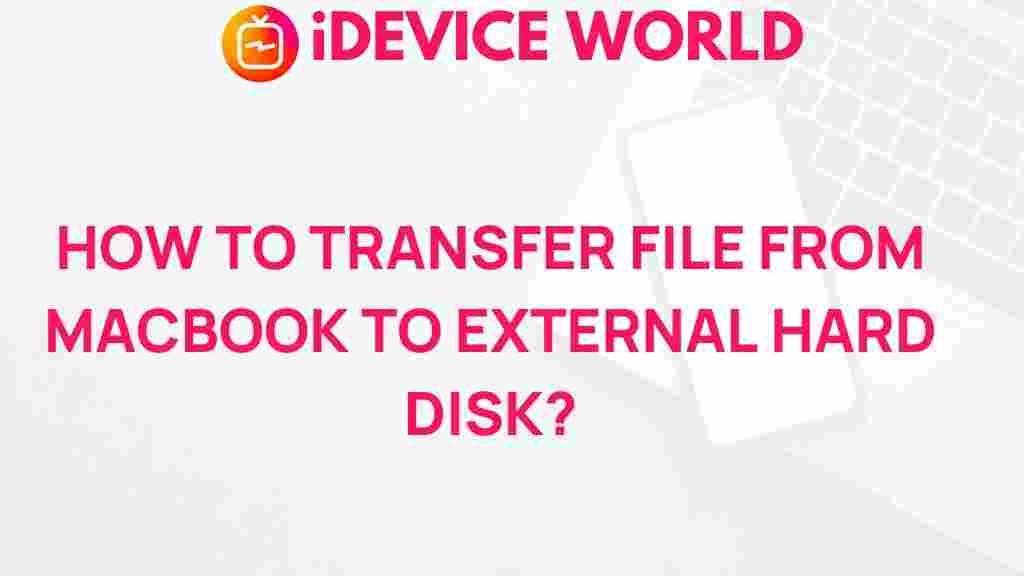Unleashing the Secrets of Transferring Files from MacBook to External Hard Drive
If you’re a proud owner of a MacBook, you might be wondering how to effectively transfer files to an external hard drive. Whether you need to free up space on your device, back up important data, or transfer files for sharing, this guide will walk you through the process step-by-step. Let’s dive into the essential methods, tips, and tricks for transferring files from your MacBook to an external hard drive.
Why Transfer Files from Your MacBook?
Transferring files from your MacBook to an external hard drive can be beneficial for several reasons:
- Free Up Space: Large files can quickly fill up your MacBook’s storage. Offloading them helps keep your device running smoothly.
- Data Backup: External hard drives are a reliable way to back up your files, ensuring that you won’t lose important data in case of hardware failure.
- File Sharing: External drives make it easy to transfer files between devices, especially when collaborating with others.
Preparing for the Transfer
Before you start transferring files, here are a few preparatory steps to ensure a smooth process:
- Check Drive Format: Ensure your external hard drive is formatted correctly. The recommended format for Mac is APFS or Mac OS Extended (Journaled). You can check this in Disk Utility.
- Connect Your Drive: Plug your external hard drive into your MacBook’s USB port. Make sure it’s powered on if it has a power source.
- Update macOS: Ensure your MacBook is running the latest version of macOS to avoid any compatibility issues.
Step-by-Step Process to Transfer Files from MacBook to External Hard Drive
Step 1: Open Finder
Start by launching Finder, which is the file management system for macOS.
Step 2: Locate Your External Hard Drive
In the Finder sidebar, look for your external hard drive under the “Devices” section. Click on it to access its contents.
Step 3: Select Files to Transfer
Navigate to the folder on your MacBook where the files you want to transfer are stored. You can select files by clicking them individually, or if you want to select multiple files, hold down the Command (⌘) key while clicking each file.
Step 4: Drag and Drop Files
Once you have selected the files, simply drag them over to the external hard drive window. Release the mouse button to drop the files into the desired location.
Step 5: Wait for the Transfer to Complete
Depending on the size of the files, the transfer may take some time. You’ll see a progress bar indicating the status of the transfer. Ensure that the files are fully transferred before disconnecting the hard drive.
Step 6: Eject Your External Hard Drive
To safely disconnect your external hard drive, right-click on its icon in the Finder and select “Eject”, or simply drag the drive’s icon to the Trash. This prevents any data loss or corruption.
Alternative Methods for File Transfer
While the drag-and-drop method is straightforward, here are some alternative methods to transfer files:
- Using Copy and Paste: You can right-click the selected files and choose Copy, then navigate to your external hard drive, right-click, and select Paste.
- Utilizing Terminal: Advanced users can use Terminal commands to transfer files, providing more control over the process.
Troubleshooting Common Issues
Sometimes, you may encounter issues when transferring files from your MacBook to an external hard drive. Here are some common problems and their solutions:
Drive Not Recognized
If your external hard drive is not appearing in Finder:
- Check the connections to ensure the drive is properly plugged in.
- Try using a different USB port or cable.
- Open Disk Utility to see if the drive is listed but not mounted. If it is, you can mount it manually.
File Transfer Stuck or Slow
If the transfer seems to be stuck:
- Pause and resume the transfer by clicking the progress bar.
- Check for background processes that may be using disk resources.
- Restart your MacBook and try the transfer again.
Insufficient Space on External Hard Drive
Make sure your external hard drive has enough space for the files you want to transfer. You can check this by:
- Right-clicking the external hard drive icon and selecting Get Info.
- Deleting unnecessary files from the drive if space is limited.
Conclusion
Transferring files from your MacBook to an external hard drive is a simple and effective way to manage your data. By following the step-by-step process outlined in this article, you can easily back up your files, free up space, and share data with others. Remember to troubleshoot common issues to ensure a smooth transfer experience.
For further reading, check out our guide on data backup strategies and learn more about maintaining your MacBook performance.
For more information on external hard drives and their features, visit this resource.
This article is in the category Guides & Tutorials and created by iDeciveWorld Team
